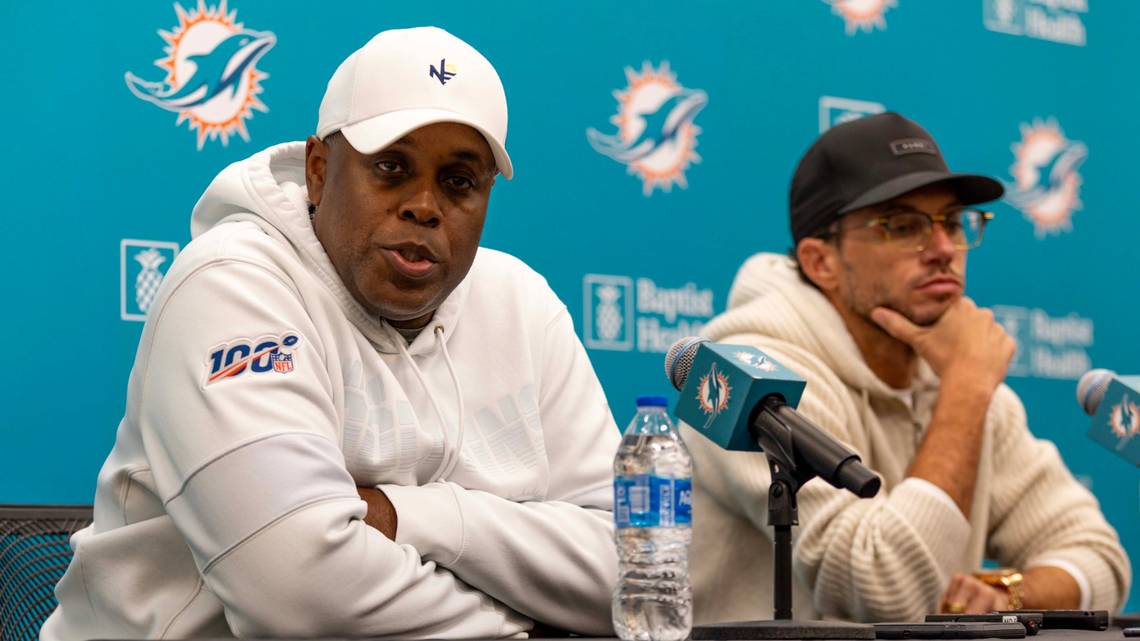The troubling aspect of Grier’s most recent Dolphins press conference and the way it transpired
In the world of professional sports, press conferences serve as a crucial platform for team executives, coaches, and players to address the public, provide insights into their strategies, and clarify any uncertainties surrounding the team’s performance and future. However, when these conferences veer off-course, they can quickly become a spectacle that leaves fans and analysts questioning the team’s direction, leadership, and transparency. Such was the case with Chris Grier’s most recent press conference for the Miami Dolphins. As the general manager of the Dolphins, Grier’s role is vital in shaping the team’s future, and his words hold significant weight. Yet, this press conference raised several troubling questions, ranging from a lack of clear communication to the apparent tension between him and other key figures in the organization.
1. Inconsistent Messaging
One of the most glaring issues in the press conference was the inconsistency in the messaging delivered by Grier. It became apparent that he was attempting to walk a fine line between being transparent with the media and maintaining a sense of optimism about the Dolphins’ future. However, his answers seemed to contradict each other on several fronts. For example, when asked about the team’s long-term vision, Grier would emphasize the importance of building through the draft and patience, but in the same breath, he would talk about the urgency of winning now. This dichotomy left fans and analysts confused about the actual direction the Dolphins are taking. Are they committed to long-term growth, or are they prioritizing immediate success at the expense of sustainable development?
The lack of clarity in Grier’s messaging led many to believe that the Dolphins may be stuck in an indecisive mode, where they cannot fully commit to either rebuilding or contending. A general manager’s role is to have a clear strategy, and when that is muddied by conflicting statements, it casts doubt on the organization’s ability to make coherent decisions moving forward.
2. Avoidance of Key Issues
Another troubling aspect of the press conference was Grier’s avoidance of certain key issues that many fans and analysts were eager to hear more about. One of the most pressing questions surrounding the Dolphins was the performance of their quarterback, Tua Tagovailoa. Tua has been the subject of much debate since being drafted, and his development—or lack thereof—has become a focal point of discussions about the team’s future. However, when directly asked about Tua’s progression, Grier’s responses were vague and non-committal.
Rather than addressing the quarterback situation head-on, Grier skirted around the topic, offering general platitudes about “evaluating talent” and “supporting the players.” While these answers may have been intended to protect Tua, they left fans with more questions than answers. In the modern NFL, where the quarterback is often considered the most important player on the team, failing to address the development or concerns surrounding Tua raised eyebrows. The Dolphins’ fan base is looking for reassurance that the team’s leadership is taking the necessary steps to help Tua succeed—or at least provide a clear path forward if the team chooses to move in another direction. Grier’s failure to offer any concrete insights into this matter only added to the growing frustration among the fan base.
3. Tension with Coaching Staff
In addition to the inconsistent messaging and avoidance of critical issues, the press conference also highlighted an underlying tension between Grier and the Dolphins’ coaching staff. While it was not overtly confrontational, there were subtle signs of discord that raised questions about the dynamics within the organization. For example, Grier was asked about the team’s performance and how the coaching staff’s vision aligned with the front office’s goals. His responses were somewhat defensive, suggesting that there may be a disconnect between the expectations of the coaching staff and the priorities of the general management team.
This tension is particularly concerning because successful NFL teams require a high level of synergy between the front office and the coaching staff. If Grier is unable or unwilling to fully support the coaching staff’s vision, it could lead to significant problems down the line. Whether this tension is due to philosophical differences or internal power struggles within the organization remains unclear, but it is a situation that needs to be addressed if the Dolphins are to succeed in the long term.
4. Failure to Address the Culture Issue
Another issue that surfaced during the press conference was the failure to address the lingering culture problem that has plagued the Dolphins in recent years. Although Grier touched on the importance of developing a strong team culture, his comments felt like surface-level responses rather than a genuine acknowledgment of the team’s struggles. Miami has been known for its underwhelming performance in the past, with inconsistent play, locker room drama, and a lack of sustained success. The Dolphins have often been labeled as a “rebuilding” team, but for that label to change, they need a solid, winning culture—something that has been sorely missing.
The fact that Grier did not delve deeper into how the Dolphins plan to address the culture issue was troubling. Simply acknowledging that “culture is important” is not enough when a team is facing recurring challenges both on and off the field. Culture is built through leadership, trust, accountability, and consistency—all qualities that must be cultivated by both the front office and coaching staff. Grier’s failure to recognize this in a meaningful way led many to believe that the Dolphins are still in the process of figuring out their identity as an organization.
5. The Media’s Role in Amplifying the Troubling Aspects
While the problems with Grier’s press conference were evident, it is also important to consider the role of the media in amplifying these issues. Journalists play a critical role in holding teams accountable and ensuring that their executives and coaches are providing honest and thorough answers. However, some reporters at the press conference seemed content to let Grier off the hook, asking only surface-level questions or failing to follow up on his vague or contradictory responses.
This lack of incisive questioning may have allowed Grier to avoid addressing the more significant issues that fans and analysts were eager to hear about. While the media is often criticized for sensationalizing certain topics, in this instance, the lack of follow-up questions left many feeling that the press conference had become more of a formality than an opportunity for meaningful dialogue. In a press conference setting, it is essential for reporters to challenge executives and coaches to ensure that they are being held accountable for their actions and decisions.
6. Fan Disillusionment and the Need for Transparency
Ultimately, the most troubling aspect of Grier’s press conference was the sense of disillusionment it left among the Dolphins’ fan base. Miami fans are some of the most passionate and loyal in the NFL, but they have endured years of underperformance and mediocrity. As such, they crave transparency, honesty, and clear direction from the leadership of the team. When Grier failed to provide any substantive answers or to address the concerns of the fan base head-on, it created a sense of frustration and distrust. Fans want to believe that their team has a plan for success, but Grier’s press conference left many questioning whether the Dolphins are moving forward or spinning their wheels.
For a franchise to succeed in the modern NFL, it is crucial for the leadership to foster a sense of unity, trust, and transparency. Fans and media members alike want to feel as though they are being included in the team’s journey and that the decisions made are being communicated openly. Unfortunately, Grier’s recent press conference seemed to indicate that the Dolphins still have a long way to go before they can fully establish that kind of relationship with their supporters.
In conclusion, Chris Grier’s most recent press conference was a missed opportunity for the Dolphins to address key issues facing the organization. From inconsistent messaging and avoidance of important topics to signs of tension between the front office and coaching staff, the press conference left many questioning the team’s direction. Moreover, the failure to tackle the ongoing culture problem within the organization added another layer of uncertainty. Ultimately, fans are looking for clarity and transparency from their team’s leadership, and Grier’s press conference failed to deliver on that front. For the Dolphins to move forward successfully, they must establish a clear vision, improve communication, and foster a winning culture—issues that Grier must address if the team is to find success in the years to come.



